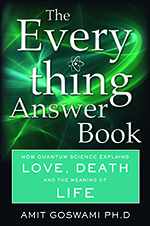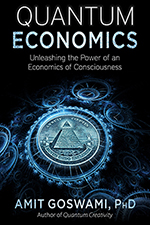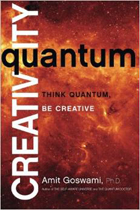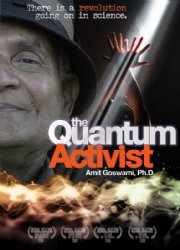Quantum Politics: Part I
By Dr. Amit Goswami
The concepts of state, citizens, and politics—the relation of state and its citizens, the relation between various sovereign states, etc.—are all quite old. Also what is old is the idea of elitism and hierarchy in politics. It has been argued for millennia that the governing body of an organization—that’s what a state is—must have expertize that ordinary people do not have; they must belong to an elite. And since the elite in this way consists of superior people, the governors and the governed must form a simple hierarchy in which the upper level (governors) dominates the lower level—the governed. For millennia, states and their politics have been organized by elites of various kinds in the form of kings, aristocrats, oligarchy, and all that.
Things were expected to change when, with the advent of modern science, a new economic system called capitalism was discovered that tended to remove the economic elite by promising a redistribution of wealth to form a vast middle class. And indeed capitalism initially delivered. Along with the idea of liberal education based on a liberal philosophy that all people are created equal and capable of acquiring expertise and making money, the idea of democracy—government of the people, by the people, and for the people—also took hold. All this happened as recently as the eighteenth century.
What does it mean to say government of the people and by the people? It was recognized, again millennia ago, that our best chance at equality in democracy lies in electing representatives of the people from amongst ourselves. What does it mean that these representative elected will work for the people? Democracy works only if these representatives use their political power to empower the people who elected them. So empowered, other people, even ordinary people, will seek and find election. In this way, power will rotate among the electorate, and elitism will be eliminated.
What is amazing is that at least in the United States and much of Europe, this “dream” of eliminating elitism in democracy and society in general was taking fruition in the twentieth century. In the 1970s, fully eighty percent of Americans belonged to the economic middle class with a large number of them college educated. Even women and racial minorities were getting opportunities to fulfill the American dream—if you worked hard enough, you could move up anywhere in society including being elected president of the country. But subsequently, this movement toward equality stopped. Why?
I have already mentioned the role of modern science in initiating all these movements toward equality. Before the advent of science, the worldview everywhere was based on what religions told us. Religions had a very old concept of hierarchy from the beginning, that of an almighty God who is the ruler of the universe. To make God acceptable along with the religious oligarchy of the leaders of religion (the Church) to the governing elite, early on, religions made a compromise of power sharing with the tacit agreement that the king or aristocrats are specially chosen by God (who else?) to rule the rest of the people in worldly matters. The king or aristocrats, in their turn, agreed to the hierarchy of the Church in religious matters.
Science challenged the authority of the Church to such an extent that a new compromise, a new worldview, came about. It was a truce called modernism: worldly matters were to be settled by science; but religious matters still belonged to the Church’s authority. Science was dominated by laws; laws knowing no elite, thereby equally applied to all material things. So naturally the idea grew that societies for dealing with worldly matters should also be governed by laws, not arbitrarily by the whim of elite kings and aristocrats who were beyond the laws. Capitalism and liberal education that “liberated people” from religious dogmas helped this transition to democracy and the rule of law.
However the religious influence on society did not entirely go away. Since the mind or psyche of people was God’s territory, here God’s rules–be good, be truthful, love everyone, otherwise known as ethics—ruled the roost. Of course, these rules were still interpreted by the Church and you could find discrepancies in how they were applied. For example, you never loved everyone equally, certainly not people who belonged to other religions, etc.
And this was good. Human civilization made giant strides under the worldview of modernism. Witness the three pillars of modern civilization: capitalism, democracy, and liberal education.
As science progressed, scientists became curious about the affairs of the psyche as well and soon discovered enough regularities (laws?) to bring to question God’s authority and, thus, also the Church’s authority.
The idea of matter-mind duality seemed to violate a sacrosanct scientific law that was discovered in the nineteenth century, the law of conservation of energy—energy of the physical universe alone always remains a constant, in all transactions. The thinking went like this: if the nonmaterial psyche interacted with matter, such interactions must involve signals that carry energy, and so energy would escape and enter the physical universe contrary to the energy conservation law.
So the psyche must not be a separate dual object; instead it must be a material phenomenon; our feelings, thoughts, even intuitions are nothing but the play of the material brain. Dualism is out. Let’s face it, religions are assuming dualism—God is separate and dual from the world. God and religions must give way to thinking that matter is the only reality, matter and its interactions causing material movement in space and time. This thinking is called the philosophy of scientific materialism.
With God and the underlying hierarchy of God reigning over us gone, democracy and the advancement of equality should get a boost, right? Wrong.
First of all, religionists did not surrender. To them it is equally appalling that we should be depicted as material machines only subjected to material laws. How about God’s laws, ethics? Without ethics, how can our social organizations function?
But religions notwithstanding, with the advent of scientific materialism, ethics lost its luster. Even religionists’ belief in ethics was shaken. Everybody became a little confused, cynical, wishy-washy about following ethics. After all, ethical laws don’t seem to be binding, do they? If you try to violate gravity, you will take a fall, an immediate punishment. But if you violate an ethical necessity to sustain democracy such as using your power to empower people, not you, there is no discernible punishment, is there?
So the immediate consequence of the advent of scientific materialism was that ethics went away from politics; politicians unabashedly began to use their power to dominate others and perpetuate hierarchy. This is a movement that began in America as a conservative movement in the 1980s (and it is still continuing), and this movement has all but stopped the liberal movement towards equality.
And in truth, the liberals, the believers in equality, also took a step backward as they continued to slide down the slippery slope of science and scientific materialism. They, too, became subscribers to a new kind of hierarchy—a hierarchy of meritocracy, of people who have the capacity of processing knowledge and information, especially the latter (more and more of it), to their advantage.
This requires some background analysis. The ideal of equality, as philosophers such as John Locke and Thomas Jefferson adapted, originally came from mystical thinking, the precursors of the world’s religions. Mystical thinking everywhere, millennia ago, was the same, in India, in the Middle East, in Greece: we should follow ethics, because underneath our separateness we are all one and therefore have a responsibility to one another’s well being. There is no God hierarchically telling you what to do. It is you, your “inner self,” your conscience which is telling you to help your neighbor. But religionists who started with the noble intention of selling this truth to the populace found it a hard sell. So they simplified their pitch for ethics in terms of reward and punishment from a hierarchical God, a stern father figure, a personification of our mystical unity.
There is more. In the eighties, just as the conservative movement of politics lost its faith in ethics and God because of scientific materialism, philosophers called deconstructionists began to shake the faith of liberals by deconstructing the idea of oneness of mystical philosophy shaking the liberal faith in ethics.
The net result is: today, politicians, liberal and conservative, do not follow ethics themselves; albeit they pay lip service to ethics for fear of political repercussions if they don’t. They use their power to dominate others, not to empower people to participate in the democratic process. Without such participation from the grass roots, the same group of people—the elite—stays in power perpetually. For these reasons—hierarchy and elitism—we don’t see democracy working in America (and other nation-states, too) today.
And it has become even worse, if you can imagine a worse scenario than this. The two elite factions support different competing worldviews: the conservatives gravitate toward the old dualist worldview of religions: the liberals toward the new worldview of scientific materialism. Both worldviews are dogmas, exclusive views of how the world works. With ethics gone, the followers of the two opposing dogmas develop intolerance toward one another. When the intolerance becomes pathological, they cannot even compromise enough to govern smoothly. The democratic ideal “government for the good of the people” is forgotten. The ideal upon which the very concept of nation-state is based, namely, the state is for us and we are for the state (all for one and one for all) is also forgotten.
Is there a remedy for this situation? This situation is against the evolutionary movement of consciousness toward more justice, more love, more goodness, and more abundance that was going on under modernism; that much is clear. So what is consciousness doing to correct this aberration? Well, the same movement of consciousness that created scientific materialism has given us quantum physics, a physics of extraordinary power to integrate. Quantum physics is based on the idea that objects are possibilities for consciousness to choose from.
Can this one idea unify the two poles of the dogmatic worldview of politics in America and other nation-states? Can this one idea rescue us from elitism in politics? Can this one idea bring back ethics? Can this one idea get rid of political intolerance? The succinct answer to all of these questions is: yes.
And that is the subject of the next article in this series. Be patient. I have to create some background for you, a context for new thinking. How consciousness enters physics is one of them. How consciousness becomes embodied in the physical world is another. When we find the answer to these questions, we also find an answer to “how to get rid of hierarchies in politics?”
Intolerance becomes pathological for religions when they, following the practice of science, interpret religious scriptures literally, as logos. But the story told there is not logo; it is myth, stories that are guidelines, not step-by-step rules, of how the more subtle aspects of us—our feelings, thinking, and intuitions—are designed to progress. Can a science based on quantum physics restore our faith in mythology? Yes, it can. It does.



